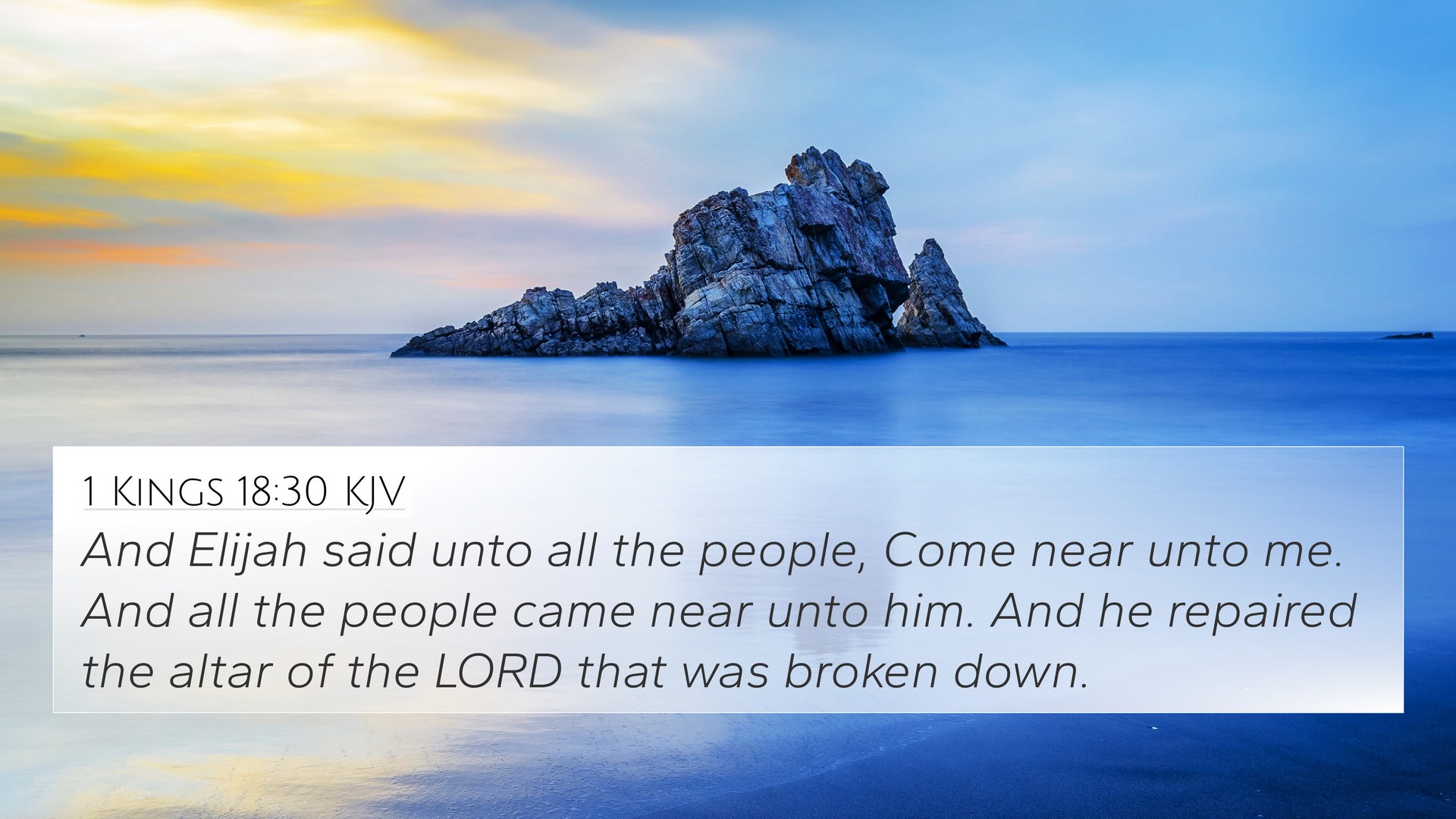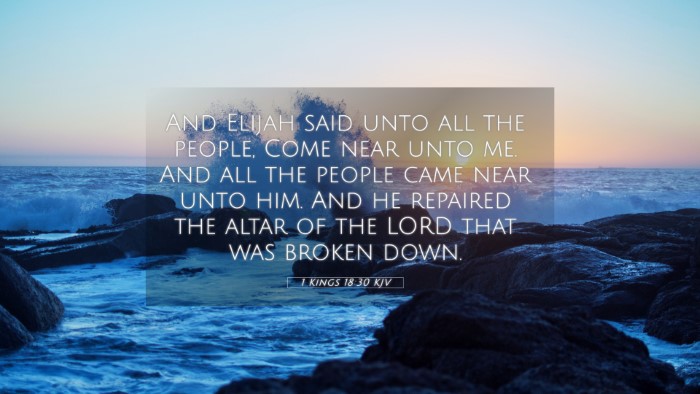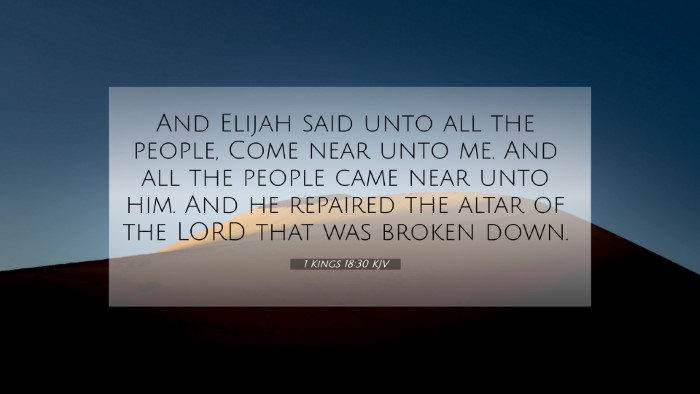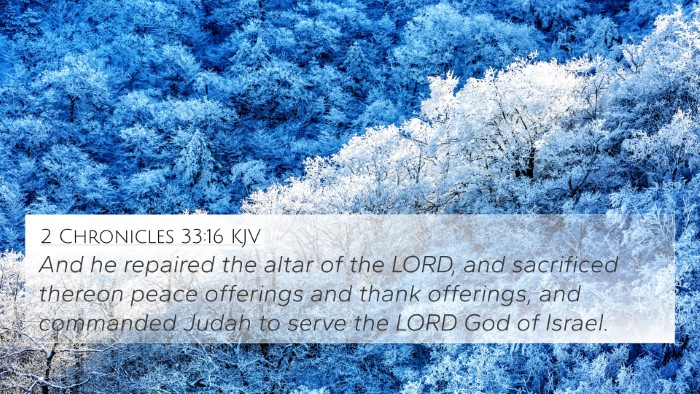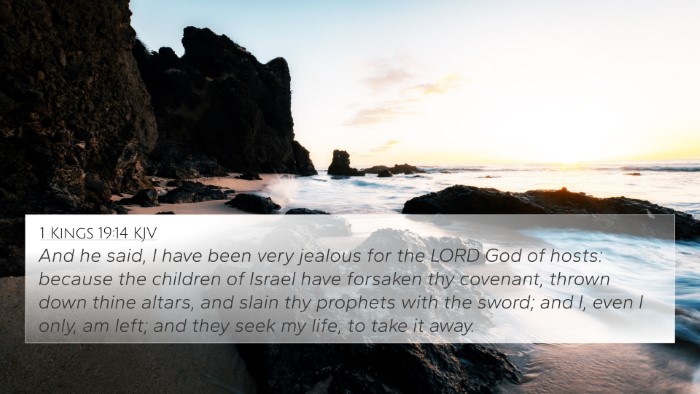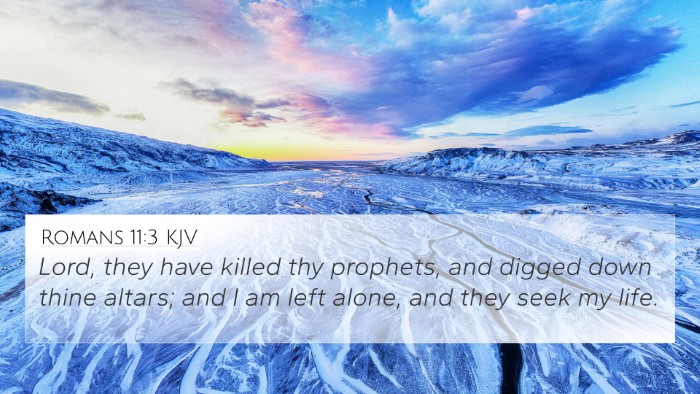Understanding 1 Kings 18:30
In this pivotal moment in the narrative of Elijah the prophet confronting the prophets of Baal, 1 Kings 18:30 reads:
"Then Elijah said to all the people, 'Come near to me.' So all the people came near to him. And he repaired the altar of the Lord that was broken down."
Interpretative Insights
This verse encapsulates a dramatic and crucial point in the confrontation between true and false worship in ancient Israel. Elijah, representing the God of Israel, takes action to restore the worship of Yahweh among the people. Several commentaries highlight key themes in this passage:
- The Call to Reunion: Elijah invites the people to draw near, signifying a need for reconnection with God after a period of apostasy. All the people gather, emphasizing the communal aspect of worship and the collective turn back to the Lord.
- The Act of Repair: The act of repairing the altar signifies the restoration of true worship and acknowledgment of the Lord's sovereignty. The broken altar represents the neglect of the covenant relationship with God, which Elijah seeks to mend.
- The Symbolism of Altars: Altars in the Old Testament serve as places of sacrifice and encounter with God. By repairing the altar, Elijah underscores the necessity of sacrifice in the faith community, which is foundational for reconciliation with God.
- Community and Responsibility: The verse reflects the shared responsibility of the people in worship. Each member of the community is called to participate actively, not to remain passive in their faith.
Connections with Other Biblical Texts
This verse has rich connections with various other scripture passages:
- Exodus 20:24: “An altar of earth you shall make for me, and sacrifice on it your burnt offerings and your peace offerings...” - This emphasizes the importance of maintaining the sanctity of the altar.
- 1 Kings 8:28-30: Solomon's dedication of the temple, where approaching God was central, connects with Elijah’s call to the people.
- Psalm 51:17: “The sacrifices of God are a broken spirit; a broken and contrite heart...” - Elijah’s repair of the altar symbolizes a return to a heart aligned with God's requirements.
- James 4:8: “Draw near to God, and he will draw near to you.” - The invitation of Elijah echoes this New Testament principle of intimacy with God.
- 2 Chronicles 7:14: “If my people who are called by my name humble themselves, and pray...” - A reminder of God’s promise to his people if they return to Him.
- Matthew 5:23-24: “So if you are offering your gift at the altar and there remember that your brother has something against you...” - The seriousness of altar work and relationships with others in worship.
- Hebrews 13:15: “Through him then let us continually offer up a sacrifice of praise to God...” - A view of contemporary worship as stemming from the ancient practices of sacrifice.
- Romans 12:1: “Present your bodies as a living sacrifice...” - This connects the physical act of repairing the altar to the spiritual act of living a life dedicated to God.
- Acts 2:38: “Repent and be baptized every one of you...” - The theme of repentance present in Elijah’s actions resonates with New Testament calls of faith.
- 1 Peter 2:5: “You yourselves like living stones are being built up as a spiritual house...” - The continued significance of altars and offerings reflecting our lives in Christ.
Thematic Reflections
The themes derived from this passage hint at broader theological discussions:
- Repentance and Restoration: The need for a collective turning back to God is stressed here, resonating with various prophetic texts calling for Israel’s return to true worship.
- Faith and Works: Faith must be demonstrated through action. Elijah's physical act of restoring the altar serves as an essential counterpart to the trust that the people must have in God.
- Public vs. Private Worship: The communal nature of this event contrasts the individualistic practices that can arise and points to the necessity of corporate worship in community life.
Conclusion: A Call to Reflection
In essence, 1 Kings 18:30 invites the reader to examine their own connections to God and community. By understanding and cross-referencing this verse with the broader biblical narrative, individuals can better appreciate the role of worship, repentance, and community in their spiritual journey.
SEO Keywords for Further Study
To deepen understanding, one may consider researching the following:
- Bible verse cross-references
- Connections between Bible verses
- Linking Bible scriptures
- Comparative Bible verse analysis
- Bible verses that relate to each other
- Cross-referencing Biblical texts
- Thematic Bible verse connections
- Bible verse parallels
- Scriptural cross-referencing
- Inter-Biblical dialogue
